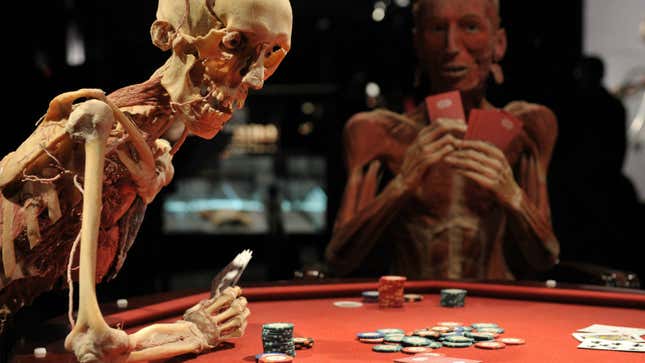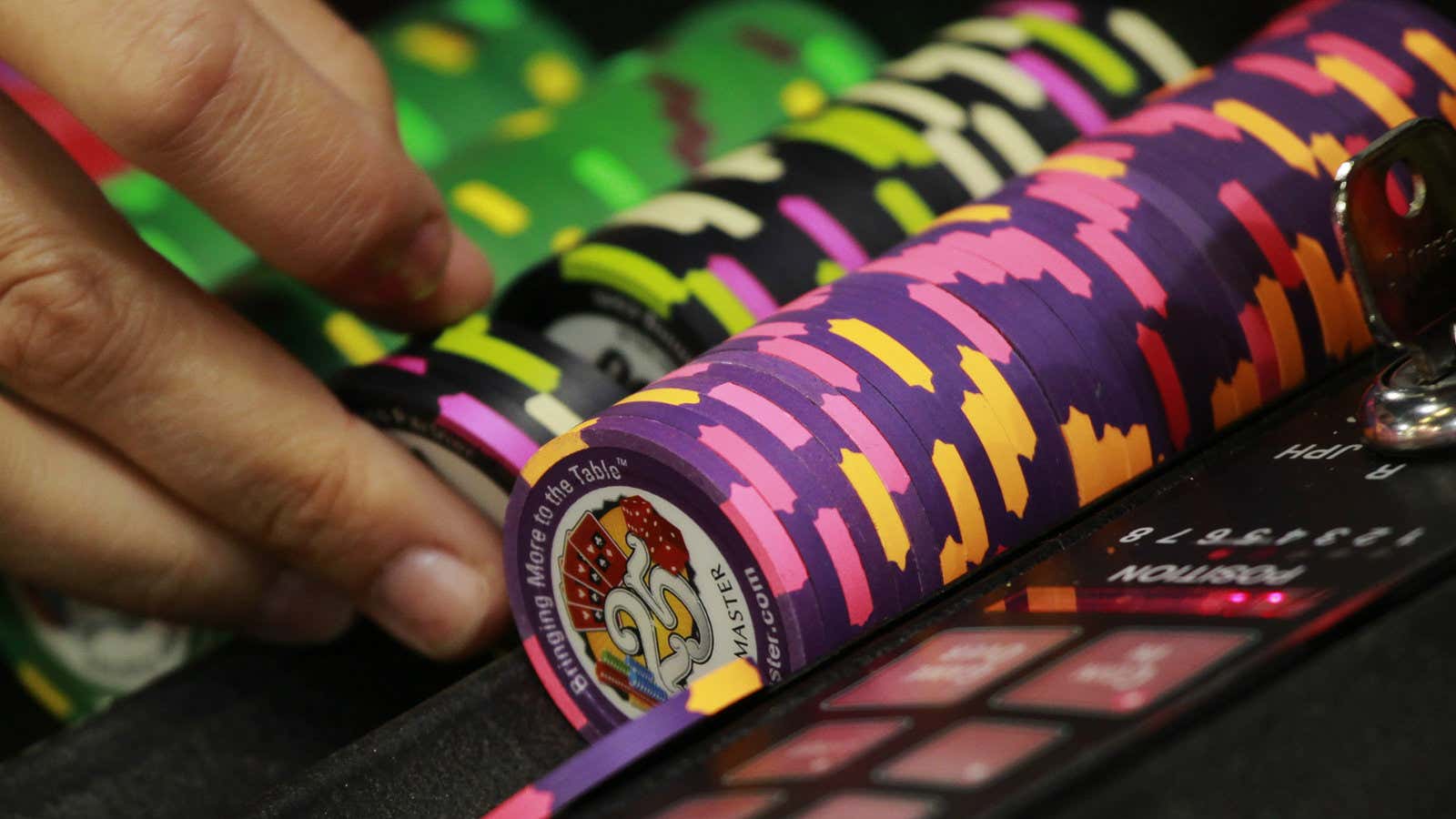The room is smoky, but more than cigarettes, it is the smell of money that fills the air. In Delhi’s Golf Links, a plush residential community, a group of 30-somethings ominously gathers around a wooden table, like sharks circling a fresh kill. These are poker sharks and there is a new fish in town. In fact, he’s such a fat fish that we’d better call him a whale.
The sharks are playing the game well, practicing “whale management.” This is no crazed feeding frenzy—this is a controlled, almost sinister procedure where the incision is deliberate and bleed is carefully controlled. The sharks first position the whale correctly—“the prime spot is to the left of the whale so you have ‘position over him’,” Siddharth tells me.
The sharks don’t take sudden bites but rather bleed him slowly—“you’ve got to keep the whale playing comfortable stakes so he doesn’t feel threatened,” Siddharth says quietly, his eyes gleaming in anticipation. Siddharth’s been sharpening his poker skills for years while working at an event management company.
I watch the players calibrate the moves, all the while making the rookie feel good about himself.
The whale starts to chase flush draws on a paired board (for the uninitiated, think of this as a fatal mistake) and the sharks sympathize. “Right move, bro,” they say as he turns white, the blood rushing out of his face, “Bad cards buddy, but you played well.” He thrashes on, coddled by his predators until they drain him of every last chip. Then they let him escape only so that he can swim back to Golf Links the next night, ready for another bleed.
Legally, cash poker games in India only exist in a few scattered places such as Goa, Sikkim, and Bengaluru. But everyone plays poker and, of late, it has arguably become an underground national obsession. This includes online poker which has six lakh registered Indian users on a single website, adda52.com. Scores of young people have given up lucrative careers to play full time. Yet, there are no regulations in place to ensure it is played responsibly.
The poker scene often operates in plush neighbourhoods in top cities in friendly sessions. But alongside these casual games, homes and farmhouses are often rented out for “raked games.” Here the house operates like a casino, taking a percentage of the pot (rake cap) in exchange for administrative hassles such as paying off cops and deciding who gets to play on credit. Since the operational stakes are so high, many believe poker’s illegality has made India home to some of the highest rake cap games in the world.
Poker chip on the shoulder
As if in consonance with high-raked games, there is a high-powered arrogance to the players. Something smug, almost superior. They are part of a growing legion of young Indian men and women—grinders, as they are known—who have decided that playing poker full-time is their calling.
I ask them what they love about poker. “It’s a game of strategy, there is skill in this game. I get to apply my brain. They even teach Poker Theory at MIT now.” says Gaurav, referring to his own undergraduate alma mater.
He’s right about poker at the Massachusetts Institute of Technology but I suspect that there are other reasons he loves the game.
“You could apply your brain at a job or something else,” I suggest making an opaque reference to his successful family business.
“But there is no job that can give me this much cash,” Gaurav laughs dismissively. He is a bit of a local poker legend in his well-heeled Mumbai circle—he recently bought a couple of luxury cars with his winnings. In cash.
A lot of what Gaurav says is echoed by the other players. There is glamour in this game as described by a young female player in typical Delhi lingo: “There is sho sha around tourneys; photoshoots, trophies, people railing around the final table. You feel like a rock star!”

Even in cash games at home, I get the feeling that many players feel like rock stars. They compare themselves to FBI agents proficient at reading people and patterns.
Vishal, a permanent fixture in this Mumbai group, looks up from his cellphone. He’s been listening to us talk for hours and only now chimes in, “Look, it’s not just the cards. I know how to read people now. I remember the patterns—I know how a player looks away when he bets or how he throws his chips or how he gives a fake smile.”
And as players talk about “tells” and “tics,” they seem convinced that poker is about understanding both technique and temperament.
Poker is like a tempestuous mistress; she is unpredictable and sexy. Once you’ve been with her, she will possess your mind long after the last card is thrown down.
For many, this mistress has become an obsession, even when players are down on their knees bleeding chips. “You continue to play because as long as you’re on the table, you can still win,” Vishal says. Many poker sessions stretch over 10-12 hours with players often needing cocaine or other drugs to help stay alert. In fact, a study suggests that four out of five poker players in the US use such drugs. Now that is a staggering statistic.
Deeply immersed
Meanwhile, Siddharth tells me about one such session, “We began playing at 6pm with eight of us on the table. By 3am, only three of us were left. We stayed on because we were losing. The losers try to win from each other. We pull line after line [of cocaine] and hope the session doesn’t end.”
Saurabh, another regular on the circuit confesses that poker has taken over his life. He narrates a story from last Diwali in Delhi, “It was the night before chhoti Diwali,” he begins, “We started playing at 6pm on Thursday. We played through the night before chhoti Diwali, all through chhoti Diwali until Diwali night. I was so stuck that I couldn’t spare two hours to leave the game to even wish my family ‘Happy Diwali’.” I interrupt him to ask, “So you played from Thursday evening until Saturday night? Over 48 hours?” He replies in the affirmative. “I had to repeatedly ask for charge for my phone and myself, if you know what I mean,” he says.
Saurabh isn’t alone in sacrificing relationships for poker.
Piya, a human resource professional, got divorced recently cites points to her love for poker as the reason. She says, “When I first started playing two years ago, we were four couples on the table. Two couples were married, one was engaged and the other was dating. Fast forward two years, and not one of our relationships lasted.”
“You start alienating yourself from everybody who isn’t connected to the game. You start missing birthday dinners, movie dates,” says Piya.
“But isn’t it fun playing on the same table as a couple?” I ask almost naively. She replies, “Look, the day we both won, it was amazing. In fact, we needed to get a bigger safe. But when we both lost, it felt like shit. And no one wins long-term. Ultimately the game always wins which means that you always lose.”
Here to stay
There is a poker term “tilt”, referring to a bend in a river, which is used when things begin to get confusing or frustrating. When you are on tilt, you make bad decisions using a less-than-optimal strategy. It would seem that the unregulated poker industry in India is on tilt right now, making bad decisions like exceptionally high-raked games, players with mounds of debt who continue to borrow, extortionist money collectors, and drugs, lots of drugs.
Poker is here to stay and there is a crying need to legalize and regulate the game in India. There are several cases pertaining to the game pending in courts that must be fast-tracked. Competent authorities need to assess a player’s credit instead of “house casinos” facilitating endless debt. This is critical for many lakhs of Indians—especially young people—who are currently drowning in the game with no lifelines.
Until that happens, they have no choice but to swim in the open sea with sharks. And swimming with sharks only ends in one way.
To protect the identities of persons mentioned in the write-up, their names have been changed. We welcome your comments at ideas.india@qz.com.




